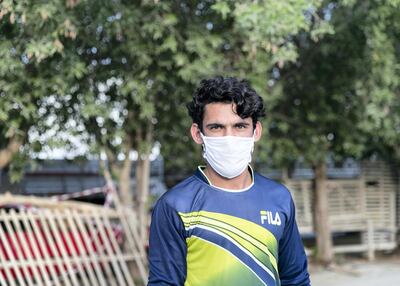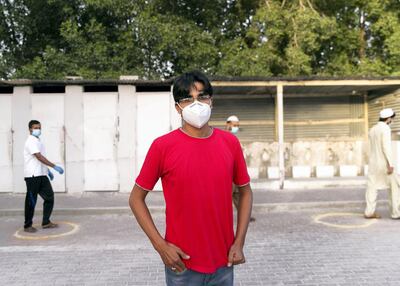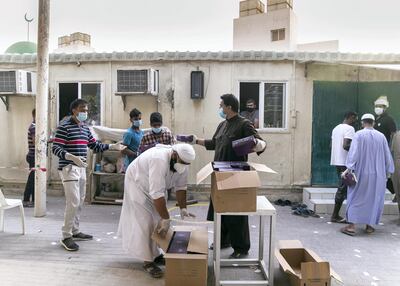With a monthly salary of Dh900, saving even Dh30 on iftar each day helps Muhammad Azad send money back to his elderly parents back home in Pakistan.
He is among thousands of workers in Dubai and Sharjah who has been receiving free iftar boxes filled with biryani, dates, fruit, laban and water.
The National was on site during one of the distributions on Friday, where nearly 1,200 workers queued up for food outside a labour camp in Dubai Investment Parks.
Pakistan Association Dubai and Model Service Society , two non-profit organisations, handed out the meals.
“If we weren’t receiving these iftar boxes, we would have to go to the grocery store and buy our own food for the day,” said Mr Azad, 27, who has been working in Dubai for 10 years.
“Buying rice, meat, vegetables and fruit every day can be expensive for us. Cooked meals, like a plate of rice, can cost less but it is a small portion.”
He said the uncertain times created by Covid-19 has made it important for him and other workers to save as much money as they can, as their concerns over job security and delayed salaries grows.
The construction sector is one among many affected by temporary closures caused by the pandemic.
But restrictions are gradually easing in Dubai and strict precautionary measures have been set in place for those returning to work in construction sites.
Workers are required to wear protective equipment, including masks, gloves and glasses. Tools and materials must be sterilised. Workers have to stay inside the site during the workday and their temperatures must be taken as soon as they disembark buses.
Ghulam Gaji, 25, has a three-month-old baby back home in India who he supports, as well as his wife and parents.
“Any free meals that we can get will help us," said Mr Gaji, who moved to Dubai nine months ago. "I don’t have a lot of my own personal expenses and I usually just spend on food, so this is helping me save.”
PAD has been sponsoring 2,500 meals for workers every day since May 4.
Rizwan Fancy, the director of the group’s welfare department, said the workers are required to eat the food in their rooms in order to maintain social distancing.
“For the last two months, many companies have no work and the staff have been sitting at home with no salary,” he said.
“They are desperate for food, especially those who rely on these kinds of distribution each year.”
Faiyaz Ahmed, a volunteer at MSS, said his organisation delivers 14,000 meals to 22 camps across Dubai and Sharjah daily.
He said the group is associated with the UAE Food Bank and they do this initiative each year for Ramadan, but the pandemic created a challenge this year.
“Our distribution model was completely different this time,” he said.
"We enjoyed going to the camp and having iftar with the workers. We used to cut the fruit in the camp and get the biryani in huge pots and serve them. Now, we pack the food items in the kitchen and we bring them here for distribution."
About 200 volunteers work with MSS to ensure they reach as many people as possible.




